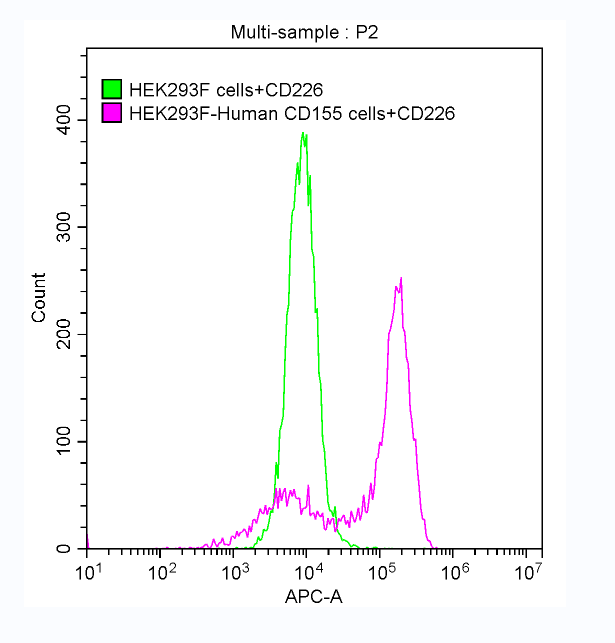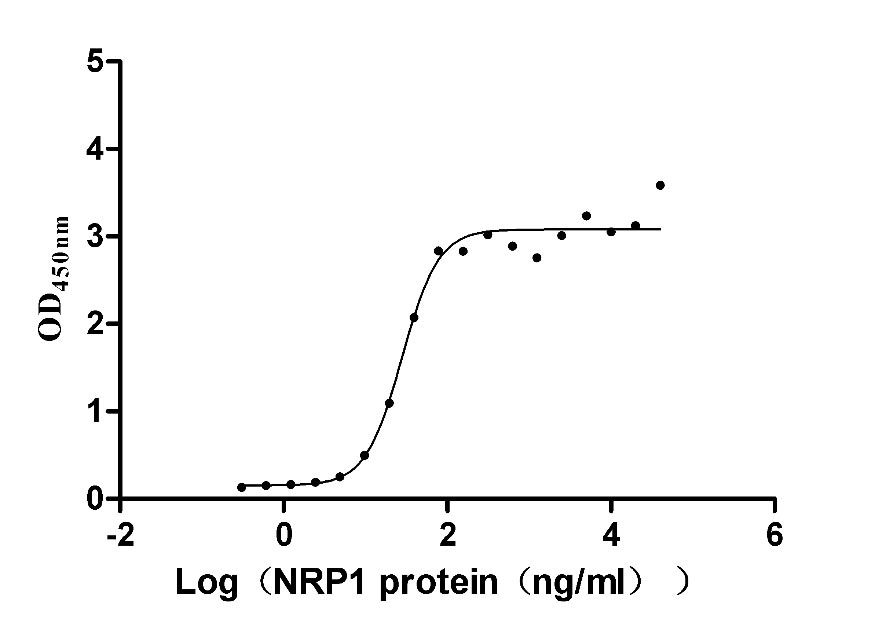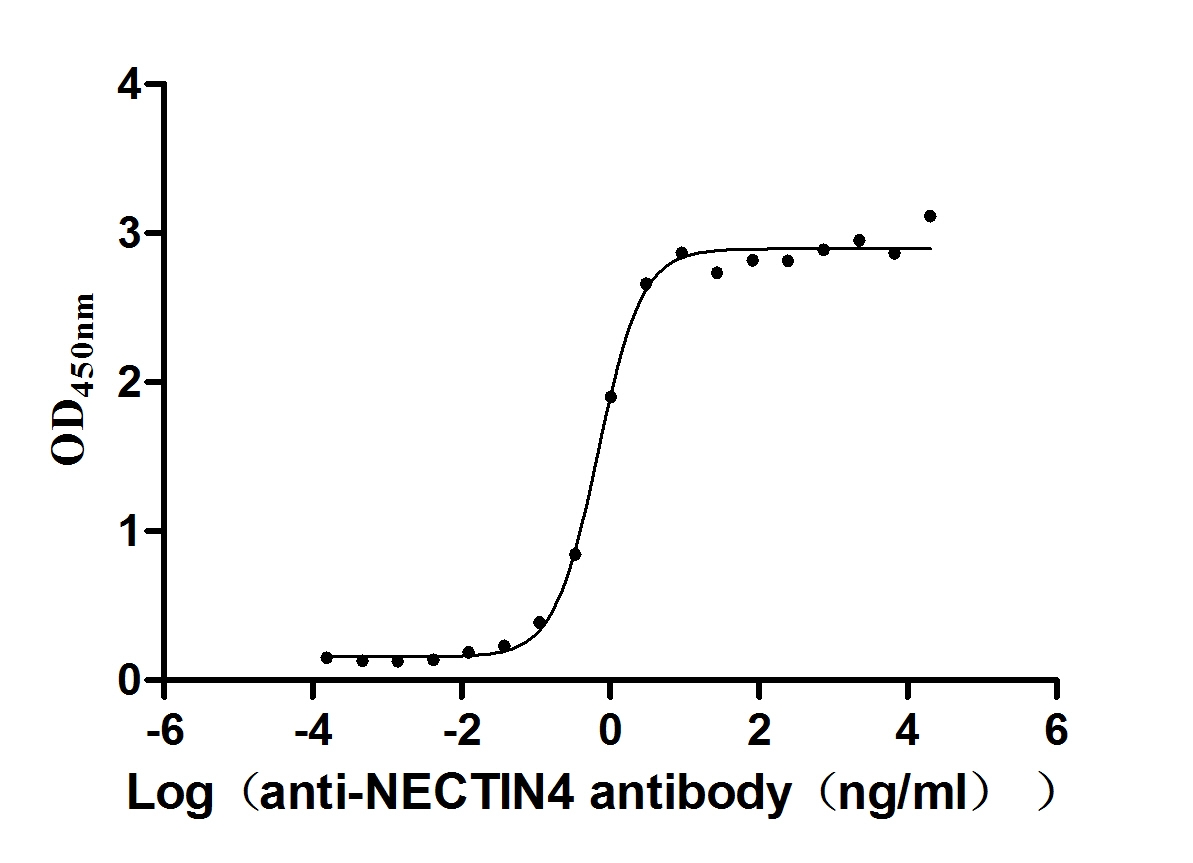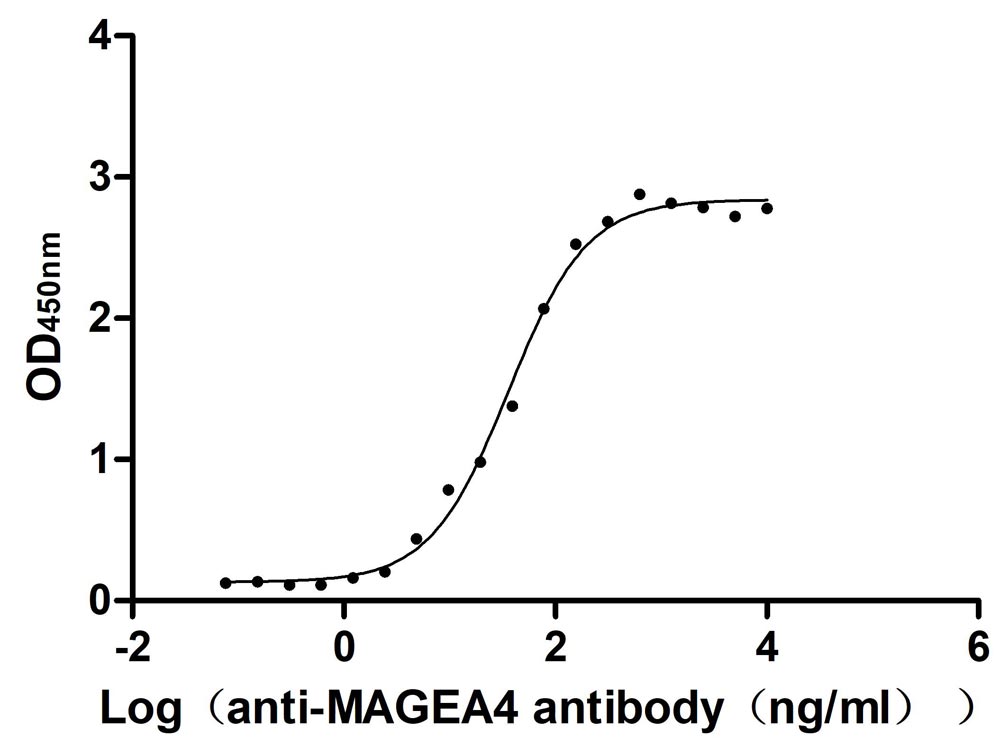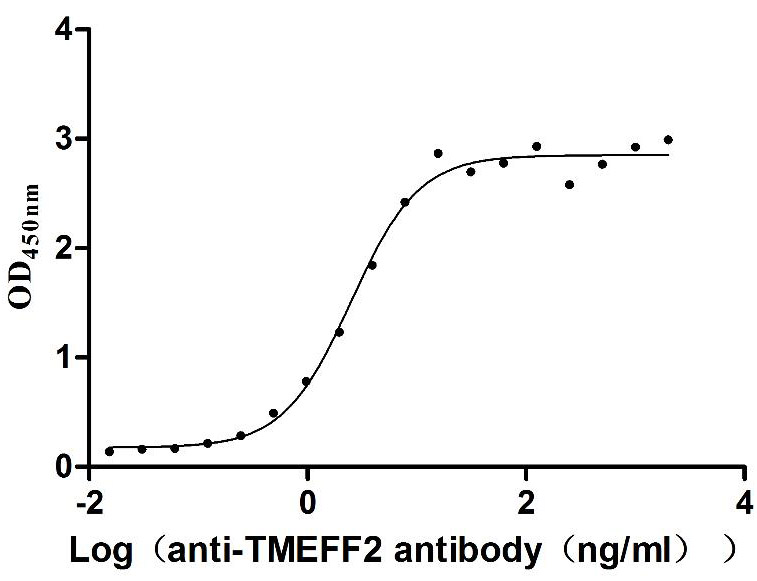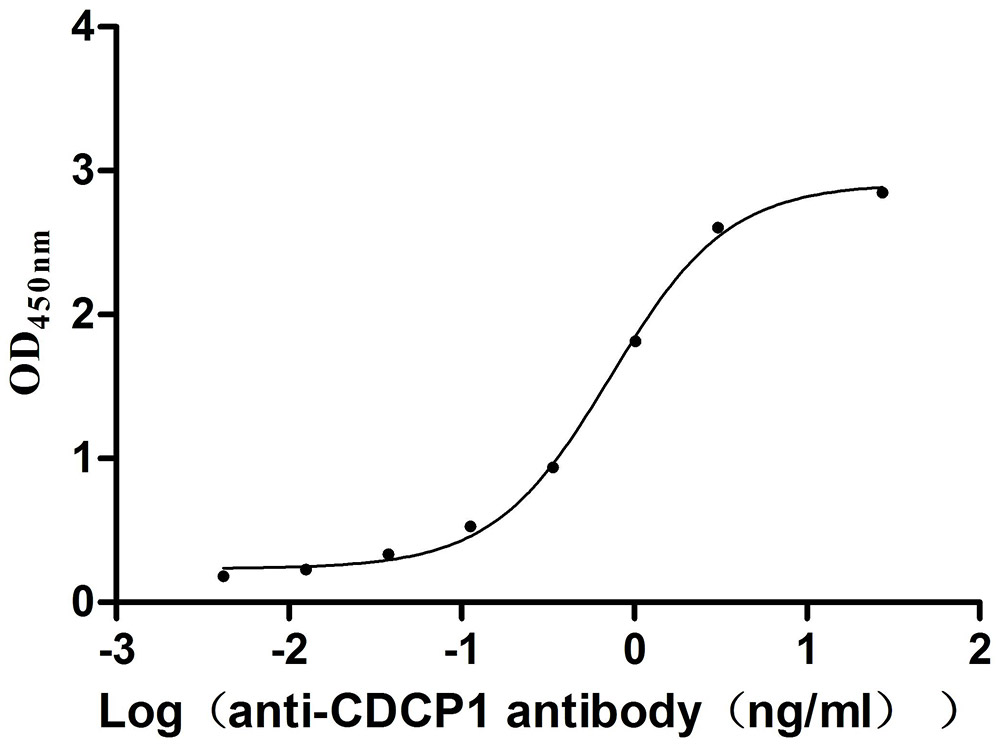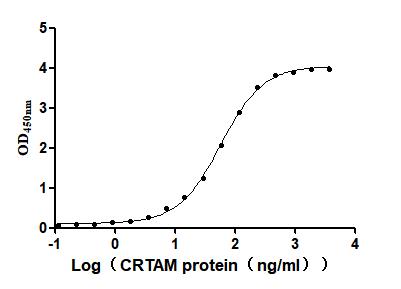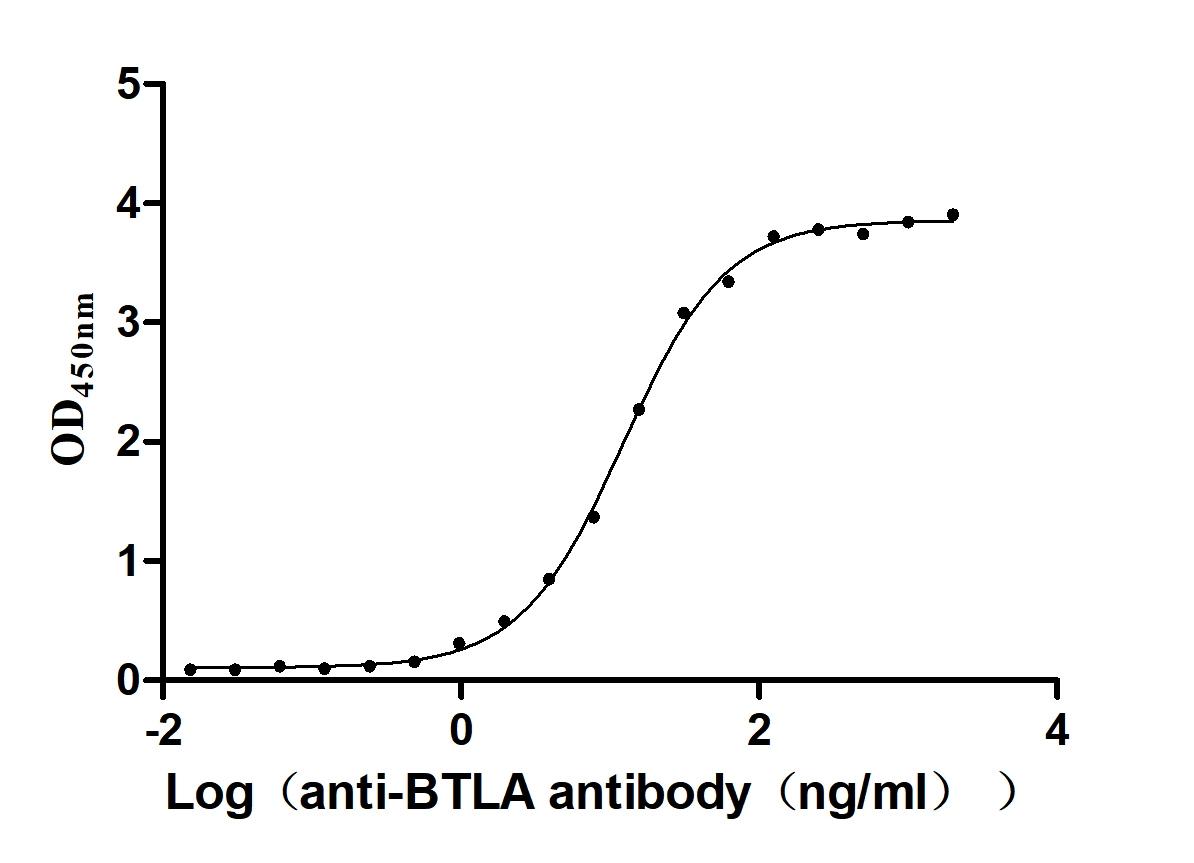Recombinant Mouse Mitogen-activated protein kinase 9 (Mapk9)
-
货号:CSB-YP013471MO
-
规格:
-
来源:Yeast
-
其他:
-
货号:CSB-EP013471MO
-
规格:
-
来源:E.coli
-
其他:
-
货号:CSB-EP013471MO-B
-
规格:
-
来源:E.coli
-
共轭:Avi-tag Biotinylated
E. coli biotin ligase (BirA) is highly specific in covalently attaching biotin to the 15 amino acid AviTag peptide. This recombinant protein was biotinylated in vivo by AviTag-BirA technology, which method is BriA catalyzes amide linkage between the biotin and the specific lysine of the AviTag.
-
其他:
-
货号:CSB-BP013471MO
-
规格:
-
来源:Baculovirus
-
其他:
-
货号:CSB-MP013471MO
-
规格:
-
来源:Mammalian cell
-
其他:
产品详情
-
纯度:>85% (SDS-PAGE)
-
基因名:
-
Uniprot No.:
-
别名:Mapk9; Jnk2; Prkm9; Mitogen-activated protein kinase 9; MAP kinase 9; MAPK 9; EC 2.7.11.24; Stress-activated protein kinase JNK2; c-Jun N-terminal kinase 2
-
种属:Mus musculus (Mouse)
-
蛋白长度:full length protein
-
表达区域:1-423
-
氨基酸序列MSDSKSDGQF YSVQVADSTF TVLKRYQQLK PIGSGAQGIV CAAFDTVLGI NVAVKKLSRP FQNQTHAKRA YRELVLLKCV NHKNIISLLN VFTPQKTLEE FQDVYLVMEL MDANLCQVIH MELDHERMSY LLYQMLCGIK HLHSAGIIHR DLKPSNIVVK SDCTLKILDF GLARTACTNF MMTPYVVTRY YRAPEVILGM GYKENVDIWS VGCIMAEMVL HKVLFPGRDY IDQWNKVIEQ LGTPSAEFMK KLQPTVRNYV ENRPKYPGIK FEELFPDWIF PSESERDKIK TSQARDLLSK MLVIDPDKRI SVDEALRHPY ITVWYDPAEA EAPPPQIYDA QLEEREHAIE EWKELIYKEV MDWEERSKNG VKDQPSDAAV SSKATPSQSS SINDISSMST EHTLASDTDS SLDASTGPLE GCR
-
蛋白标签:Tag type will be determined during the manufacturing process.
The tag type will be determined during production process. If you have specified tag type, please tell us and we will develop the specified tag preferentially. -
产品提供形式:Lyophilized powder
Note: We will preferentially ship the format that we have in stock, however, if you have any special requirement for the format, please remark your requirement when placing the order, we will prepare according to your demand. -
复溶:We recommend that this vial be briefly centrifuged prior to opening to bring the contents to the bottom. Please reconstitute protein in deionized sterile water to a concentration of 0.1-1.0 mg/mL.We recommend to add 5-50% of glycerol (final concentration) and aliquot for long-term storage at -20℃/-80℃. Our default final concentration of glycerol is 50%. Customers could use it as reference.
-
储存条件:Store at -20°C/-80°C upon receipt, aliquoting is necessary for mutiple use. Avoid repeated freeze-thaw cycles.
-
保质期:The shelf life is related to many factors, storage state, buffer ingredients, storage temperature and the stability of the protein itself.
Generally, the shelf life of liquid form is 6 months at -20°C/-80°C. The shelf life of lyophilized form is 12 months at -20°C/-80°C. -
货期:Delivery time may differ from different purchasing way or location, please kindly consult your local distributors for specific delivery time.Note: All of our proteins are default shipped with normal blue ice packs, if you request to ship with dry ice, please communicate with us in advance and extra fees will be charged.
-
注意事项:Repeated freezing and thawing is not recommended. Store working aliquots at 4°C for up to one week.
-
Datasheet :Please contact us to get it.
靶点详情
-
功能:Serine/threonine-protein kinase involved in various processes such as cell proliferation, differentiation, migration, transformation and programmed cell death. Extracellular stimuli such as proinflammatory cytokines or physical stress stimulate the stress-activated protein kinase/c-Jun N-terminal kinase (SAP/JNK) signaling pathway. In this cascade, two dual specificity kinases MAP2K4/MKK4 and MAP2K7/MKK7 phosphorylate and activate MAPK9/JNK2. In turn, MAPK9/JNK2 phosphorylates a number of transcription factors, primarily components of AP-1 such as JUN and ATF2 and thus regulates AP-1 transcriptional activity. In response to oxidative or ribotoxic stresses, inhibits rRNA synthesis by phosphorylating and inactivating the RNA polymerase 1-specific transcription initiation factor RRN3. Promotes stressed cell apoptosis by phosphorylating key regulatory factors including TP53 and YAP1. In T-cells, MAPK8 and MAPK9 are required for polarized differentiation of T-helper cells into Th1 cells. Upon T-cell receptor (TCR) stimulation, is activated by CARMA1, BCL10, MAP2K7 and MAP3K7/TAK1 to regulate JUN protein levels. Plays an important role in the osmotic stress-induced epithelial tight-junctions disruption. When activated, promotes beta-catenin/CTNNB1 degradation and inhibits the canonical Wnt signaling pathway. Participates also in neurite growth in spiral ganglion neurons. Phosphorylates the CLOCK-ARNTL/BMAL1 heterodimer and plays a role in the regulation of the circadian clock. Phosphorylates POU5F1, which results in the inhibition of POU5F1's transcriptional activity and enhances its proteosomal degradation.
-
基因功能参考文献:
- these results identify a protective role of epithelial JNK2 signaling to maintain mucosal barrier function, epithelial cell integrity, and mucus layer production in the event of inflammatory tissue damage PMID: 28098247
- The MAP kinase JNK2 mediates cigarette smoke-induced tissue factor activation, arterial thrombosis and reactive oxygen species production. PMID: 27761579
- JNK-2 regulates aggrecan degradation in cultured murine cartilage and surgically induced osteoarthritis in vivo following mechanical destabilization of the knee joint. PMID: 26663140
- This study demonstrated that the disruption of JNK2 appears to have a greater impact on tolerance than the other isoforms in the tail-flick but not the hot-plate test. PMID: 26914092
- morphine activated JNK2 through an arrestin-independent Src- and PKC-dependent mechanism, whereas fentanyl activated JNK2 through a Src-GRK3/arrestin-2-dependent and PKC-independent mechanism. PMID: 26056051
- studies herein support that JNK2 inhibits cell differentiation in normal and cancer-derived mammary cells PMID: 25970777
- Presynaptic c-Jun N-terminal Kinase 2 regulates NMDA receptor-dependent glutamate release. PMID: 25762148
- gene deficient mice displayed defective mitophagy, which resulted in tissue damage under hypoxic stress, and increased sepsis PMID: 25799126
- JNK2 activates pro-survival autophagy and inhibits palmitic acid lipotoxicity in hepatocytes. PMID: 24608675
- GITR stimulation of nTregs and signaling through JNK2, but not JNK1, triggered the loss of regulatory function while concomitantly gaining pathogenic CD4(+) T effector cell function responsible for exacerbating asthma-like immunopathology. PMID: 25070841
- JNK2 phosphorylation of Klf4 negatively regulates Klf4 transcriptional and transactivation activities and involved in ES cell differentiation as well as somatic cell reprogramming. PMID: 24211391
- Inhibition or deletion of JNK2 protects mice lacking cFLIP in hepatocytes from hypoinsulinemic liver injury. PMID: 23828575
- The results show that acute alcohol elevation of CYP2E1, oxidative stress, and activation of JNK2 interact to lower autophagy and increase lipogenic SREBP resulting in fatty liver. PMID: 22749809
- JNK2 signaling is a major early pathway triggering retinal ganglion cell (RGC) death after axonal injury and may directly link axon injury to transcriptional activity that controls RGC death. PMID: 22353563
- JNK2 regulated nucleolin expression and might in turn stabilize hif-1alpha mRNA. PMID: 22910906
- The data identified the key signal converging point of JNK2 and ERK pathways and underline the central role of protein phosphatase 2A in ras transformation. PMID: 21706057
- Increased serum alanine aminotransferase, inflammatory infiltration, and central necrosis were observed in the jnk2(-/-) and WT mice treated with pyrazole plus TNF-alpha, but not in the jnk1(-/-) mice. PMID: 21748763
- JNK2 plays an important role in spindle assembly. PMID: 21281539
- Cell cycle arrest in mouse embryos occurs without lethality during 24 hours of rotation and simulated microgravity; however, a growing list of nonphysiological stimuli also activate SAPK and its dependent negative effects. PMID: 19546324
- critical role for JNK2 and EPS8 in receptor tyrosine kinase signaling and trafficking to convey distinctly different effects on cell migration. PMID: 21357683
- data strongly suggests the importance of JNK2 in intestinal carcinogenesis and the importance of dietary manipulation for cancer prevention in the population whose JNK2 is inactivated PMID: 21183606
- Our results provide useful informaion on the role of JNK2 in antibody responses mediated by T cell-independent antigens. PMID: 20665951
- The role of JNK2 in the mechanism of osmotic stress-induced tight junction disruption in the intestinal epithelium in 3 species is described. PMID: 20595622
- JNK2 prevents replicative stress by coordinating cell cycle progression and DNA damage repair mechanisms. PMID: 20454618
- JNK2 collaborates with other oncogenes, such as Ras, at multiple molecular levels to promote tumorigenesis PMID: 20354187
- data suggested that JNK2, like JNK1, interacts with and suppresses beta-catenin signaling in vitro and in vivo, in which GSK3beta plays a key role PMID: 19675674
- JNK1 and JNK2 signal pathways have distinct roles in T cell responses during a viral infection, JNK2 plays a role in control of CD8(+) T cell expansion PMID: 11927625
- Jnk2(-/-) mice were as susceptible to experimental autoimmune encephalomyelitis as wild-type mice PMID: 12147621
- MUK/DLK/ZPK, and JNK2 activity increase potently and temporally in newly generated neurons in developing mouse telencephalon during radial migration PMID: 12223406
- PTHrP induced dephosphorylation of JNK2, and PTHrP-induced insulin expression was blocked by a dominant-negative type JNK-APF. PMID: 14578290
- Jnk2-/- fibroblasts exit G1 and enter S phase earlier than wild-type counterparts, while Jnk1-/- cells show the inverse phenotype PMID: 15350216
- JNK2-dependent phosphorylation of scavenger receptor A (SR-A)promotes uptake of lipids in macrophages, thereby regulating foam cell formation, a critical step in atherogenesis PMID: 15567863
- JNK2 is not essential for TNF-alpha-induced c-jun kinase activation and apoptosis. PMID: 15572687
- JNK2 inactivates the transcription factor TIF-IA and down-regulates rRNA synthesis during cellular stress. PMID: 15805466
- Study of JNK2-deficient mice highlights the specific role of JNK2 in hippocampal synaptic plasticity during development. PMID: 15816869
- JNK2 may have a role in type 1 diabetes as seen in the mouse model PMID: 15867147
- JNK2 positively regulates the cJun transcription factor and competition between JNK1 and JNK2 contributes to the opposite phenotypes caused by JNK1 and JNK2 deficiency. PMID: 16973441
- A role for JNK2 in mediating inflammatory responses and severe malaria in vivo was demonstrated. PMID: 17056565
- Deletion does not protect mice from renal fibrosis in the unilateral ureteral obstruction model. PMID: 17202416
- p-JNK2 was not alterd by phenotyp, but was reduced by CR in both normal and KO mice. PMID: 17301033
- Negatively regulates antigen-specific CD8-positive T cell expansion and effector function. PMID: 17301952
- Genetic deletion of JNK2 worsens the disease outcome in an experimental model of murine colitis by prolonging the activity of proinflammatory immune cells with deterioration of disease activity. PMID: 17365404
- Osteoclastic protein-tyrosine phosphatase (PTP-oc) activates osteoclast activity in part by promoting osteoclast survival through the PTP-oc-mediated c-Src-dependent activation of NFkappaB and JNK2. PMID: 17400176
- JNK2 is an important regulatory protein for IFN-gamma secretion upon challenge with A. phagocytophilum PMID: 17998313
- JNK2 contributes to hepatocellular injury and death after ischemia/reperfusion in association with increased mitochondrial dysfunction. PMID: 18497693
- JNK2 promotes graft injury via the mitochondrial permeability transition after mouse liver transplantation. PMID: 18671679
- JNK2 plays critical role as mediator of hypercholesterolemia-induced endothelial dysfunction and oxidative stress. JNK2 may provide novel target for prevention of vascular disease and atherosclerosis. PMID: 18955669
- JNK activity is specifically required for the late-stage differentiation events of osteoblasts. PMID: 19016586
- The data presented suggest that JNK stress-kinases are involved in sodium butyrate-induced senescence in E1A + cHa-Ras mouse transformants, and they are indicative of that JNK2 has tumor suppressor properties. PMID: 19140343
- c-Jun terminal kinase-2 gene deleted mice overexpress hemeoxygenase-1 and are protected from hepatic ischemia reperfusion injury. PMID: 19667931
显示更多
收起更多
-
亚细胞定位:Cytoplasm. Nucleus.
-
蛋白家族:Protein kinase superfamily, CMGC Ser/Thr protein kinase family, MAP kinase subfamily
-
组织特异性:All four isoforms are widely distributed in brain. Isoforms alpha-1 and alpha-2 are predominantly expressed in hippocampus, cerebral cortex, caudate-putamen, amygdala and the granule layer of the cerebellum. Alpha-1 is more abundant than alpha-2 in the pe
-
数据库链接:
KEGG: mmu:26420
STRING: 10090.ENSMUSP00000020634
UniGene: Mm.68933
Most popular with customers
-
Recombinant Human CD226 antigen (CD226), partial (Active)
Express system: Mammalian cell
Species: Homo sapiens (Human)
-
Recombinant Human Neuropilin-1 (NRP1) (Active)
Express system: Mammalian cell
Species: Homo sapiens (Human)
-
Recombinant Human Nectin-4 (NECTIN4), partial (Active)
Express system: Mammalian cell
Species: Homo sapiens (Human)
-
Recombinant Human Melanoma-associated antigen 4 (MAGEA4) (Active)
Express system: Mammalian cell
Species: Homo sapiens (Human)
-
Recombinant Human Tomoregulin-2 (TMEFF2), partial (Active)
Express system: Mammalian cell
Species: Homo sapiens (Human)
-
Recombinant Mouse CUB domain-containing protein 1 (Cdcp1), partial (Active)
Express system: Mammalian cell
Species: Mus musculus (Mouse)
-
Recombinant Mouse Cytotoxic and regulatory T-cell molecule (Crtam), partial (Active)
Express system: Mammalian cell
Species: Mus musculus (Mouse)
-
Recombinant Human B- and T-lymphocyte attenuator(BTLA), partial (Active)
Express system: Mammalian cell
Species: Homo sapiens (Human)


